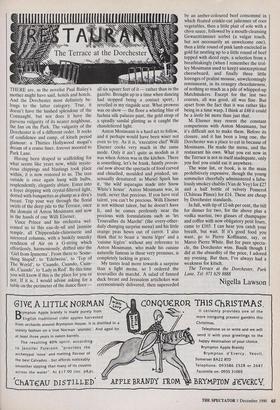juiumtig
The Terrace at the Dorchester
THERE are, as the novelist Paul Bailey's mother might have said, hotels and hotels. And the Dorchester most definitely be- longs to the latter category. True, it doesn't have the hushed splendour of the Connaught, but nor does it have the parvenu vulgarity of its nearer neighbour, the Inn on the Park. The vulgarity of the Dorchester is of a different order. It reeks of confidence and camp, of kitsch period glamour: a Thirties Hollywood mogul's dream of a cruise liner, forever moored to Park Lane.
Having been draped in scaffolding for what seems like years now, while myste- rious chippings and blastings took place within, it is now restored to us. The tree outside is once again hung with bulbs, resplendently, elegantly ablaze. Enter into a foyer dripping with crystal-filtered light, dotted with banquettes as plump as a diva's breast. Trip your way through the florid swirls of the deep pile to the Terrace, once the domain of Anton Mosimann and now in the hands of one Willi Elsener.
Vince Prince and his orchestra wel- comed us to this eau-de-nil and jasmine temple, all Chippendale-chinoiserie and mirrored columns, with a huskily muzaky rendition of Air on a G-string which effortlessly, harmoniously, drifted into the `Girl from Ipanema'. From there to 'Some- thing Stupid', to 'Edelweiss', to 'Top of The World', to `Cuando, Cuando, Cuan- do, Cuando', to 'Lady in Red'. By this time you will know if this is the place for you or not. If it is, I would advise asking for a table on the perimeter of the dance floor — all six square feet of it — rather than in the gazebo. Brought up in a time when dancing had stopped being a contact sport, I revelled in my ringside seat. What prowess was on show — the floor a whirling blur of fuchsia silk palazzo pant, the gold strap of a spindly sandal glinting as it caught the chandeliered light.
Anton Mosimann is a hard act to follow, and it perhaps would have been wiser not even to try. As it is, 'executive chef' Willi Elsener cooks very much in the same mode. Only it ain't quite as modish as it was when Anton was in the kitchen. There is something, let's be frank, faintly provin- cial now about the spectacle of food carved and chiselled, moulded and prinked, un- sensually denatured: as Muriel Spark has it, 'the wild asparagus made into Snow White's house'. Anton Mosimann was, in truth, never that precious. If you have real talent, you can't be precious. Willi Elsener is not without talent, but he doesn't have It, and he comes perilously near the precious with formulations such as 'les Trouvailles du Marche' (the every-other- daily changing surprise menu) and his little orange peas hewn out of carrot. I also think that to boast a 'menu leger' and a `cuisine legere' without any reference to Anton Mosimann, who made his cuisine naturelle famous in these very premises, is completely lacking in grace.
My tastes lead more towards a surprise than a light menu, so I ordered the trouvailles du marche. A salad of fanned duck breast and Jerusalem artichokes was ceremoniously delivered, then superceded by an amber-coloured beef consommé in which floated crinkle-cut juliennes of root vegetables, then a little plait of sole with a chive sauce, followed by a mouth-cleansing Gewurztraminer sorbet (a vulgar touch, but not necessarily an unwelcome one), then a little round of pink Iamb encircled in gold fat nestling up to a little round of beef topped with diced ceps, a selection from a breathtakingly (when I remember the trol- ley Mosimann used to keep) unexceptional cheeseboard, and finally three little lozenges of praline mousse, unwelcomingly reminiscent, in its orangey chocolateness, of nothing so much as a pile of whipped-up Matchmakers. Except for the last two courses, all was good, all was fine. But apart from the fact that it was rather like being in a time warp, I think at £48 it could be a leetle bit more than just that.
M. Elsener may resent the constant comparisons with Anton Mosimann, but it's difficult not to make them. Before its closure, and it has been a long one, the Dorchester was a place to eat in because of Mosimann. He made the menu, and the restaurant his own. What you eat now in the Terrace is not in itself inadequate, only you feel you could eat it anywhere.
The wine list, or book, is in the main prohibitively expensive, though the young sommelier cheerfully administered a fabu- lously smokey chablis (Van de Vey) for £27 and a half bottle of velvety Pomerol (Château Plince) for £14. These are cheap by Dorchester standards.
In full, with tip of 12-ish per cent, the bill for dinner for two, for the above plus a vodka martini, two glasses of champagne and coffee with now obligatory petit fours, came to £165. I can hear you catch your breath, but wait. If it's good food you want, go to Pierre Koffmann, say, or Marco Pierre White. But for pure specta- cle, the Dorchester wins. Baulk though I did at the absurdity of the price, I adored my evening. But then, I've always had a weakness for kitsch.
The Terrace at the Dorchester, Park Lane, Tel: 071 629 8888
Nigella Lawson










































































 Previous page
Previous page